Editorial
Disorderly House
The highest policy-making body in the land must mend its shoddy image soon.
In the three decades and a bit since the restoration of democracy in 1990, Nepal’s national Parliament has never been able to function effectively. This is largely due to its failure to institutionalise parliamentary norms and values. The role of top leaders of major political forces is crucial in guiding the House in the right direction. But, instead, Nepali politicians have often held the legislature hostage to their interests. For instance, when leaders cannot agree on a power-sharing deal, they disrupt House proceedings, completely forgetting their duties as lawmakers. Interestingly, the parliamentarians seem to adhere to different sets of norms depending on whether their mother parties are in the government or not.
Right now, the Parliament is running out of time to prorogue the ongoing House session and commence the budget session. Less than three weeks before the constitutional deadline to present the government's annual budget, the winter session is still dragging on. (The government apparently wants it to pass a few more bills.) The constitution makes it mandatory to unveil the budget on May 29 and the Parliament has to complete some important business before that. The Speaker must allow pre-budget deliberations on the House floor, which needs to be done 15 days ahead of budget presentation. He then has to allocate time for the presentation of the government’s policy and programme by the President. Following this, the lawmakers will debate the document for a few days. Then, priorities are set and funds earmarked based on the principles of the policy and programme and the lawmakers' feedback.
But the Parliament may not be able to complete the due process in what little time remains. At present, the leaders have been wasting their time bargaining for their share of the pie in the yet-to-be-formed 12 parliamentary committees. Wasting weeks in bargaining and reaching a deal in the last hour has become our politicians' ingrained habit–in which case the Parliament invariably has to suspend rules and fast-track procedures to endorse vital bills. This has become an accepted practice thanks to the blessing it has gotten from the top political leadership. The end result is that the parliamentary processes have been limited to no more than rituals. To see their chosen representatives thus waste vital state funds is heartbreaking for common folks. And if the occupants of some of the highest offices in the land can be so unaccountable, why should the rest of us need to follow any rules!
Cancellation of scheduled agendas for the lack of quorums and constant deferral of scheduled bills due to weeks or months-long House disruptions have become chronic problems. The highest policy-making body in the land must mend its shoddy image soon. Or wider disenchantment may follow. Already, the public’s faith in Nepali legislatures is razor-thin. Experts have emphasised the need for the House to work according to a strict calendar. That would add to the body’s legitimacy. On the other hand, the constant undermining of the legislative through the making (and breaking) of ad hoc rules will further shake people’s faith in the parliamentary system.




 13.12°C Kathmandu
13.12°C Kathmandu














